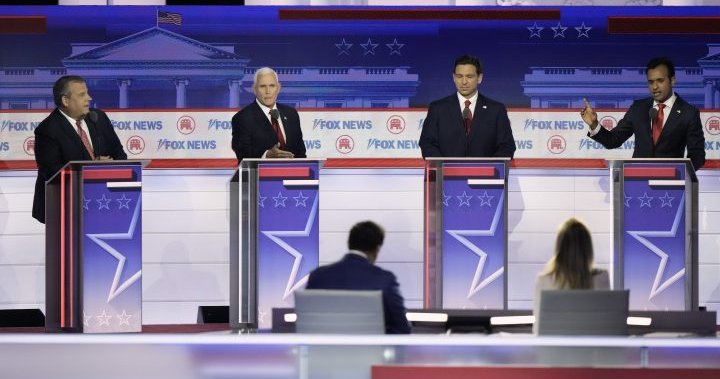President Joe Biden has garnered bipartisan support for his strong backing of Ukraine against Russia’s invasion. However, as the 2024 presidential campaign intensifies, the leading Republican contenders are showing antipathy towards American support for Ukraine, which puts the unity on this issue to the test.
During the first GOP presidential debate, Florida Gov. Ron DeSantis suggested that additional U.S. aid to Ukraine should be contingent on increased contributions from European allies. Entrepreneur Vivek Ramaswamy argued that the U.S. should prioritize its own border security rather than protecting Ukraine. Former President Donald Trump, a leading GOP contender, has claimed that he will end Russia’s invasion in one day if he regains the White House, a statement that even some of his Republican allies consider to be folly. Trump has also called on Congress to withhold Ukraine funding until evidence on the Biden family’s business dealings is handed over by the FBI, IRS, and Justice Department.
While Republican congressional leaders and Biden remain aligned in providing Ukraine with necessary assistance, the voices in the Republican field calling for reduced support for Ukraine send a concerning signal to allies about America’s commitment post-2024 election. This echoes a historical tradition of isolationism that led to disastrous results in the past.
Biden’s campaign spokesman, Kevin Munoz, criticized “MAGA Republicans” on the debate stage for siding with Russian President Vladimir Putin over Ukraine and mocked U.S. politicians who showed solidarity with Ukrainian President Volodymyr Zelenskyy by visiting Kyiv. Munoz argued that they should prioritize issues affecting Americans.
Former United Nations Ambassador Nikki Haley rebuked Ramaswamy on the debate stage, stating that he was effectively supporting Putin and overlooking U.S. interests.
Despite these differing views, the White House emphasizes that key Republican lawmakers, including Senate Republican leader Mitch McConnell, largely agree on the need to continue assisting Ukraine.
Biden’s administration has called on Congress to provide over $13 billion in emergency defense aid to Ukraine and an additional $8 billion for humanitarian support by the end of the year. The United States has already committed more than $60 billion in aid to Ukraine since the start of Russia’s invasion.
Public support for providing weapons and economic assistance to Ukraine has softened over time, with a decline in favorability among both Democrats and Republicans. Many Republican lawmakers, aligned with Trump’s objections to foreign involvement, have reservations about allocating more federal funds for the war effort.
The debate over Ukraine reflects a struggle within the Republican Party, with the issue serving as a proxy in the battle for the party’s ideology. The handling of the Ukraine war may not be the most salient issue for voters, but it can influence perceptions of Biden’s competency and success in restoring U.S. leadership on the international stage after Trump’s “America first” approach.
Overall, the unity on Ukraine between Republicans and Democrats faces challenges as the 2024 presidential campaign unfolds, with potential implications for the future of U.S. support for Ukraine and broader foreign policy considerations.
Denial of responsibility! VigourTimes is an automatic aggregator of Global media. In each content, the hyperlink to the primary source is specified. All trademarks belong to their rightful owners, and all materials to their authors. For any complaint, please reach us at – [email protected]. We will take necessary action within 24 hours.


